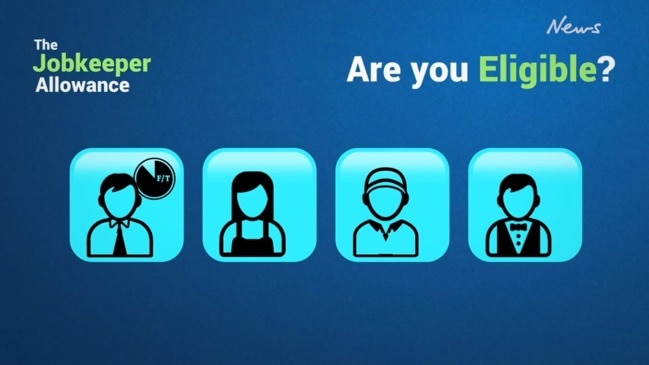Coronavirus, JobKeeper: ‘Forgotten’ freelancers miss out on $1500
The JobKeeper wage subsidy was designed to keep Australians in jobs – but one group says they have been left to “fall through the cracks”.

Australia’s film and TV industry is among the worst hit by the coronavirus crisis, leaving thousands out of work and without incomes.
But while the industry has been devastated by the outbreak, a technicality means most workers have been excluded from the Federal Government’s JobKeeper package, which covers full-time and part-time workers, sole traders and casuals who have been working for the same employer for at least one year.
That’s because most workers in the sector – from producers to make-up artists, film and tech crew, caterers and everyone in between – are employed as freelancers.
RELATED: 1.1m Aussies screwed out of $1500 payment
RELATED: ‘What happens if I can’t pay my rent?’
But Sydney TV producer Alex Spurway told news.com.au while she and so many others were technically employed as freelancers, she had back-to-back contracts and received all the same benefits as full-time staff such as holiday pay, sick leave and superannuation.
She said she couldn’t understand why freelancers had been “forgotten” by the Morrison Government.
“A couple of weeks ago my entire industry shut down – all film and TV production had to stop, which meant thousands and thousands of Australians lost their jobs and the prospect of future work,” she said.
“I had two contracts lined up after the one that just finished and that’s completely gone now. “What people are forgetting is that yes, I’m a freelancer, but I am still employed full time on a contract with an end date – and that’s just how it works in the industry. My biggest fear is that myself and thousands of other Australian employees will be left behind.”

Ms Spurway said her only option was to register for the JobSeeker payment, which is $400 less than JobKeeper and does not come with the benefit of guaranteed work.
“I’m used to being employed back to back, and I manage my year so it is chock-a-block full of work. This is the first time in 3½ years I’ve not had a job lined up,” she said.
“Our industry has been hit so hard because everything had to be shut down, and I don’t understand why the Government hasn’t thought about us. There’s a hashtag on social media, #NoWorkerLeftBehind, but I truly feel we are being left behind. It doesn’t make sense that freelancers have no access to JobKeeper.”
The 32-year-old said the proposed wage subsidy didn’t apply to her colleagues, and she felt they were “falling through the cracks”.
“We consider ourselves full-time employees and we have all the benefits that come with that, so why is it that when JobKeeper was announced, freelancers weren’t included? That’s a big question of mine and one I don’t have an answer to,” she said.
“Half a year’s worth of work is gone for me now, and it’s scary.”
Ms Spurway praised the Government for introducing a raft of measures to help struggling workers but said no worker should be left behind. She said it was also difficult to make sense of the official information and to find out how it applied to your individual circumstances.
Meanwhile, the Media, Entertainment & Arts Alliance (MEAA) has called on the Government to “clarify and if necessary amend” the eligibility criteria, which currently excludes a large proportion of the arts and entertainment workforce.
The MEAA said it was particularly concerned about freelance performers and crew engaged as direct employees on short-term contracts on a production-by-production basis but not registered as a business and casual workers who have not been with the same employer for 12 months.
The organisation said thousands of workers in the arts and entertainment industries could be forced onto the welfare system.
“We welcome the income subsidy scheme and urge employers in the arts and entertainment sectors to rehire any workers they have stood down,” MEAA chief executive Paul Murphy said.
“The subsidy is intended to keep about six million Australians in the workforce, but there are complexities within the scheme that may have inadvertently resulted in freelance employees – people whose work is episodic and from gig to gig – being excluded.
“The Government urgently needs to clarify if freelance employees are eligible in the same way sole traders with an ABN are, and if they are not, this must be fixed.”
Mr Murphy said the nature of work in the screen and live theatre industry was that people were often employed for a short period of time by a company that is set up specifically as the corporate vehicle for a production and is wound up at the end of that production.
The length of employment with that particular company may only be for a couple of months, but employment in the industry is ongoing with multiple different companies.
These types of employees are typically paid a wage and are part of the PAYG tax system while they are employed and are not set up as a sole trader business with an ABN.
A further complexity is that freelancers may have lost income they have not earned yet for productions they were contracted to work on later this year but, as a result of COVID-19, have now been cancelled or postponed indefinitely.




